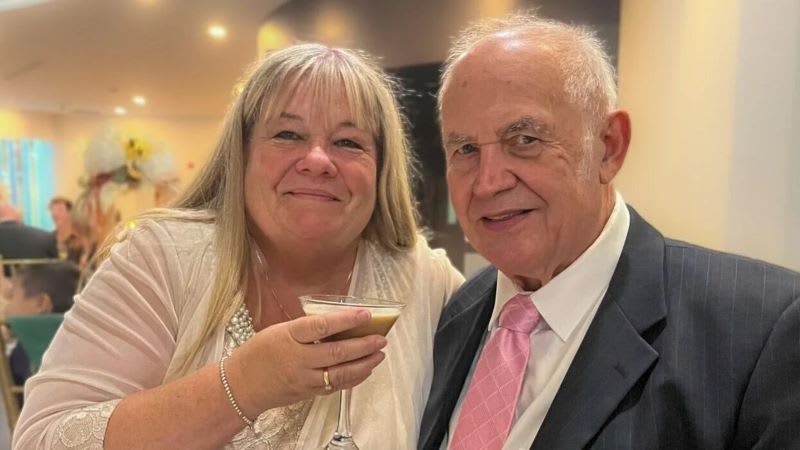This is an opinion column by Niagara Health Senior Communications Specialist Diane Moore, published in the St. Catharines Standard, Niagara Falls Review and Welland Tribune.

Denise and Donald Kennedy joined a national study aimed at better understanding outcomes of the COVID-19 virus after Donald's ordeal with the coronavirus.
When Donald Kennedy fell seriously ill with COVID-19 in early 2022, he ended up spending three months in the hospital fighting for his life.
“We really didn’t know if he was going to make it,” said his wife, Denise Kennedy. “He was so seriously ill, that there were a number of times I got phone calls from nurses saying he is really not doing well.”
The couple’s ordeal began after returning from Christmas holidays in Florida, where their son lives. A few days after arriving home, Denise felt tired and unlike her usual self. She shrugged it off as being tired from the trip and started feeling fine a few days later.
That’s when Donald started to cough.
His cough soon got so hard he could barely catch his breath, so Denise decided to take Donald to the emergency department at St. Catharines hospital.
“They told us that he had severe COVID-19 and started the treatments right there in emergency,” Denise recalled.
Donald was placed on oxygen and admitted to hospital.
In hindsight, Denise said she wonders if her fatigue wasn’t COVID-19, too.
Two days later, Denise got a phone call that Donald was being transferred to the intensive care unit (ICU) with severe COVID-19 pneumonia and would be put on a ventilator. Donald would end up spending a total of 21 days on a ventilator over the course of three months in hospital while he fought for his life.
He also suffered with failing kidneys, blood clots, internal bleeding, anxiety and depression connected to his COVID-19 diagnosis.
“The nurses there, they kept him alive,” Denise said. “They were doing everything they could and certainly those were very trying times.”
Due to visitor restrictions at the height of the pandemic's Omicron wave, Denise sometimes had to get her updates on Donald’s condition by phone.
“I was told I could call any time,” Denise recalled.
After narrowly surviving, Donald decided to use his experience to help shed light on both short- and long-term outcomes of the illness in patients and their caregivers. He and Denise joined a national study aimed at better understanding outcomes of the COVID-19 virus, and predictors of those outcomes.
A total of seven patients from Niagara Health joined the study. Dr. Margaret Herridge and Dr. Angela Cheung at University Health Network spearheaded the research, following 2,000 patients and caregivers from the provinces hit hardest by COVID-19: Quebec, Ontario, Alberta and British Columbia.
“Getting more knowledge on the long-term outcome of a novel disease, such as COVID-19, is important to allow the scientific and health-care community to find ways to treat and support survivors and caregivers,” said Dr. Jennifer LY Tsang, executive director and chief scientist at Niagara Health Knowledge Institute.
Donald ended up being the only patient from NH’s intensive care unit, and Denise the only caregiver from NH, to participate in the study. They were followed for one year, completing surveys, phone interviews and, in Donald’s case, blood work.
“We thought maybe this information can help someone else,” Denise said. “It seemed like the right thing to do.”
“Donald struggled in the ICU for a long time,” said Tsang. “So, it was rewarding for me to be part of his care journey and follow him throughout the study.”
Participating in the study also allowed her team to learn from scientists and researchers across Canada while contributing to the study results, the final details of which are still being worked into a research paper.
Involvement in studies such as this are part of the mission to lead community hospital-based research. Historically, most medical research has been conducted in academic hospitals in larger centres, such as Toronto. Tsang is a strong advocate for balancing research by including community hospitals in smaller or rural centres, where 90 per cent of hospitals in Canada are located.
As for Donald, he continues to make progress in his recovery, two years later.
“I keep reminding Don of his improvement,” Denise said. “Because he can get frustrated as a person who’s used to being busy with carpentry or playing the guitar.”
Reflecting back on the early days of Donald’s diagnosis, Denise said it’s obvious to her the nurses weren’t just caring for her husband — they were caring for her, too.
“I saw the care that they were giving to him, they saved his life, but I also felt that they cared about me, too. The nurses were always telling me, ‘You need to go get a coffee. Get some food.’ And they were always sharing what information they could with me, from the little progresses Donald made to when he would slide back. I wanted to be as prepared as I could and they made me feel like a part of the team.”

